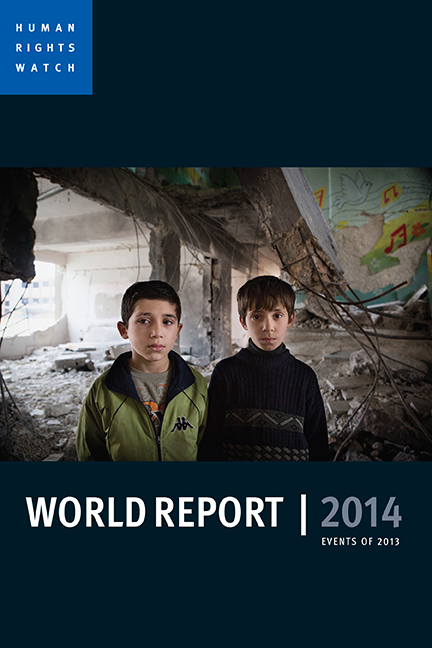Book contents
- Frontmatter
- Dedication
- HUMAN RIGHTS WATCH
- Table of Contents
- Foreword
- Rights Struggles of 2013: Stopping Mass Atrocities, Majority Bullying, and Abusive Counterterrorism
- The Human Rights Case for Drug Reform How Drug Criminalization Destroys Lives, Feeds Abuses, and Subverts the Rule of Law
- Putting Development to Rights: Integrating Rights into a Post-2015 Agenda
- The Right Whose Time Has Come (Again) Privacy in the Age of Surveillance
- Photo Essays
- AFRICA
- AMERICAS
- ASIA
- EUROPE AND CENTRAL ASIA
- MIDDLE EAST AND NORTH AFRICA
- UNITED STATES AND CANADA
- 2013 HUMAN RIGHTS WATCH PUBLICATIONS
- Acknowledgments
- Frontmatter
- Dedication
- HUMAN RIGHTS WATCH
- Table of Contents
- Foreword
- Rights Struggles of 2013: Stopping Mass Atrocities, Majority Bullying, and Abusive Counterterrorism
- The Human Rights Case for Drug Reform How Drug Criminalization Destroys Lives, Feeds Abuses, and Subverts the Rule of Law
- Putting Development to Rights: Integrating Rights into a Post-2015 Agenda
- The Right Whose Time Has Come (Again) Privacy in the Age of Surveillance
- Photo Essays
- AFRICA
- AMERICAS
- ASIA
- EUROPE AND CENTRAL ASIA
- MIDDLE EAST AND NORTH AFRICA
- UNITED STATES AND CANADA
- 2013 HUMAN RIGHTS WATCH PUBLICATIONS
- Acknowledgments
Summary
Unlike most other Gulf states, Qatar has not experienced serious domestic unrest. Yet the human rights climate remains problematic, particularly for the large and growing migrant worker population. Migrants continue to experience serious rights violations, including forced labor and arbitrary restrictions on the right to leave Qatar, which expose them to exploitation and abuse by employers. Qatar's poor record on freedom of expression declined further with the announcement of a draft cyber crime law.
Migrant Workers’ Rights
Qatar is upgrading its infrastructure in preparation for the 2022 FIFA World Cup, but authorities have yet to implement reforms that are needed to afford foreign migrant workers adequate protection against serious rights abuses, including forced labor and trafficking.
According to official 2013 statistics, Qatar has a population of about 2million, of whom only 10 percent are Qatari nationals. The number of economically active foreign nationals increased by 122,000, almost 10 percent, in the 12 months from April 2012, and is expected to rise further in response to the demands of Qatar's burgeoning construction sector.
Qatar's Law 14 of 2004 regulating labor in the private sector limits workers’ hours requires that they receive paid annual leave, sets requirements on health and safety, and requires on-time payment of wages each month. However, the authorities fail to enforce this and other laws intended to protect workers’ rights.
Workers typically pay exorbitant recruitment fees and employers regularly take control of their passports when they arrive in Qatar. The kafala (sponsorship) system ties a migrant worker's legal residence to his or her employer, or sponsor. Migrant workers commonly complain that employers fail to pay their wages on time if at all, but are barred from changing jobs without their sponsoring employer's consent other than in exceptional cases and with express permission of the Interior Ministry. Adding to their vulnerability, they must obtain an exit visa from their sponsor in order to leave Qatar. Migrant workers are prohibited from unionizing or engaging in strikes, although they make up 99 percent of the private sector workforce.
Many migrant workers live in cramped, unsanitary conditions, especially those working without documentation.
Workers can become undocumented when employers report them as having absconded, or when they fail to pay to renew workers’ annual ID cards. A lack of proper documentation leaves workers at risk of arrest and detention or deportation.
- Type
- Chapter
- Information
- World Report 2014Events of 2013, pp. 596 - 599Publisher: Bristol University PressPrint publication year: 2014

